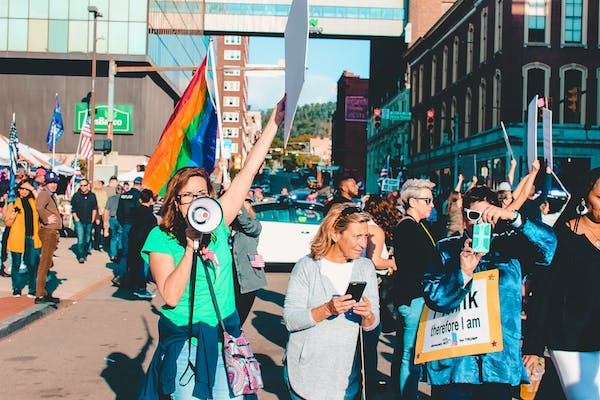As social creatures, we naturally crave communication with others. However, the people we tend to interact with are from different backgrounds. They have different upbringings from us, and their personality could vary.
These differences could create a dent in interaction.
Feeling like an outcast who doesn’t belong might be unsettling. If you’re having problems blending in, there are steps you may take to improve your situation.
Here are 21 easy-to-follow guidelines that will make you a normal person and not a weirdo.
1. Accept the differences

Happiness and a stress-free life can be yours if you can learn to care less about other people’s opinions of you. When you’re secure in who you are, you project an image of normalcy to the world.
The less you care about fitting in, the more assured you’ll feel (and come across as). You can focus less on people’s perceptions of you and more on the individuals who matter most to you because of this.
2. Exhibit confidence and self-assurance with your body language

Even if you’re nervous and out of place, you may fake confidence and assurance using your body language.
New research suggests that striking a “power pose” can alter your brain chemistry, causing the release of testosterone (which boosts confidence) and the suppression of cortisol (which contributes to feelings of stress).
By projecting self-assurance, you “open” yourself to others. Don’t assume the slumped, closed-off posture that raises stress hormones by crossing your arms over your chest or letting your legs dangle awkwardly.
Go somewhere private and strike a power stance for at least two minutes before entering a space that makes you uneasy (such as a new social setting, a classroom, or an engagement with people who have ridiculed you).
Simply seeing oneself in a strong, confident image will help. Stand with your hands on your hips and your shoulders back.
3. Think things through rationally

Before taking any action, think it through. Picture all the scenarios and how you would handle each situation.
Let’s say you have been invited to a party. Imagine who you could meet there. If there is a likelihood of meeting someone who usually makes fun of you to the merriment of others, be prepared for the situation and how to wade such a person off.
If is there a likelihood of you giving a speech, be prepared.
You will gain social acceptance as a result of being more calculative about your routines and behaviors.
4. Feel at ease with the way you express yourself

You should be conscious of your social interactions but understand that other people pay less attention to your peculiarities.
Try to get others involved by asking them questions and letting them do the talking while you work on this. If you want to feel less like the centre of attention, talk about something you’re already familiar with.
Do not think it is all about you, be relaxed. When you don’t pressure yourself, you blend easily. Don’t be in the habit of thinking it is all about you.
5. Take care of your body

Changing your eating habits and getting regular exercise can do wonders for your health. When you feel better, you accept yourself more fully and project an air of self-assurance to the world.
Your mental and emotional well-being will also benefit from regular exercise.
Maintain a nutritious diet. Make an effort to consume a variety of healthful foods every day. Indulging in a single ice cream cone or bag of potato chips once in a while won’t make you unhealthy. Be careful not to overdo it. If you only indulge in goodies on rare occasions, each one will have more of an impact.
Try to work out frequently. Get up from the couch and enjoy the outdoors if you’re a chronic couch potato. You may go for a bike ride, a swim, or a stroll. Keeping active is a great way to maintain your health and fitness.
6. Always try something new

The majority of people are not adaptable. However, in order to broaden our perspectives, we must be willing to try new things.
You will gain insight into the activity and yourself regardless of how much you enjoy it. Explore a new interest in the company of a friend.
When you try new things, it will reduce the likelihood of you being weird when confronted with such.
7. Connect with those who share your interests and values

It might be challenging to make friends and find a community when you’re a newcomer, especially if you’re from a different cultural background. Find people who share your experiences and perspectives. You’ll do better in your transition if you surround yourself with individuals who understand where you’re coming from.
Feeling normal, loved, and understood is facilitated by this.
Meetup.com, community centres, university cultural clubs, and places of worship are all good places to start looking for like-minded people with whom to share interests and activities.
8. Imitate the style of the people around you

When you see yourself mirrored in the clothes or actions of someone you like and admire, it can boost your self-esteem and make you feel more confident.
Affirmation from a mirror can make you feel safer and more a part of the group until you reach a point where you feel confident enough to take a more independent style.
But always start off behaving like the general rule. Once you have blended in, you can try to be unique. At this point, you won’t be treated as an alien.
9. Adapt to your environment

Learning to adapt is an essential skill, and it’s not just applicable to learning a new culture. Look around the room as you enter it. Don’t act in a way that would be out of place if everyone else around you is feeling a certain way, especially if that emotion is sadness. When individuals are already offended and feeling isolated, cracking a crude joke can only make things worse.
Take in everyone’s facial emotions and body language. Do they seem kind and open? Or are they withdrawn and grimacing? Do they give off vibes of ease and comfort or of tension and rigidity?
Is everyone whispering, talking normally, or laughing out loud? Whichever it is, act accordingly.
10. Follow the lead of those close to you and mimic their actions

One way to make others accept you as “one of them” is to act in ways that are consistent with their own.
However, this requires caution.
The fact that something is commonly done doesn’t absolve someone of wrongdoing simply because it’s the standard. Avoid risky or hazardous activities like heavy drinking or drug use, even if doing so makes you feel like an outcast.
Consider picking up an interest in football if that’s what everyone else seems to be doing. Go to a few games and study the fundamentals. You don’t have to force yourself to continue if you’re really bored.
11. Possessing Solid Social Abilities

Get out and mingle with others. Being sociable and open to establishing new acquaintances is the best strategy for this. Try not to overthink things like fitting in or not with a certain group of people.
If you can get along with them, your friendship with them will be quite normal. If you have friends, people will be more likely to talk to you.
12. Act with courtesy and respect

People who are easy to be around tend to be held in high esteem. When around people you know well and trust, it’s only natural to be yourself. However, strive to be more polite when trying to make a good impression.
One, get out and mingle with others! Contrarily, it is possible to attract attention by withdrawing from the public eye. Avoid alienating friends and colleagues by consistently declining their invitations.
Even with someone you know well, going out in public can be nerve-wracking. Your ideal evening might not always include an invitation to it. However, being able to engage in a wide variety of social activities will help you blend in with the crowd and gain people’s trust.
13. Meet new people by putting yourself out there

Volunteering or working in an environment where you interact with clients both provide a steady stream of potential test subjects. Any mistakes will have less of an impact.
More frequent opportunities to communicate with others each day will lead to quicker improvement than less frequent encounters.
14. Don’t give everything away right away

It’s wonderful to meet someone new, but it takes a little while of “ice breaker” conversations before you can relax and be yourself around them.
Until you get to know someone, it’s not a good idea to talk about sensitive matters like health, sexuality, past trauma, etc.
When getting to know a new buddy, it’s important to watch what you say so as not to offend them.
15. Keep your feelings under check

Intense feelings are natural and even encouraged. However, large, disproportionate displays of emotion (particularly wrath and sadness) can be unsettling.
Try to keep your cool when faced with minor setbacks and find healthy ways to express your emotions. Don’t become angry, yell, hurl objects, or get physical.
Express your displeasure in a quiet, polite, and calm manner whenever possible.
Seek professional help if you find yourself losing your temper frequently or if you have cause to suspect that depression is a factor in your life.
There is no such thing as “crazy” people who need to see therapists. They can be little more than a sympathetic ear in a moment of need, or they can be crucial in their own right.
16. Restrain your extreme views

Strong feelings about particular topics, such as LGBTQ, politics, religion, etc., are typical. Reasonable arguments with other people on these topics are also acceptable.
However, you may become somewhat of a social outcast if you constantly insult or attack people for having beliefs that differ from your own.
Be open-minded and at least listen to the points of view of others.
17. Ask follow-up questions

When you initially ask someone a question, they may not respond for a while since they aren’t sure if you’re being serious or courteous.
Asking a follow-up question, like “After lectures, what do you do?” demonstrates your interest in continuing the conversation.
What do you really like about hiking?
How often do you attend festivals?
Your honesty is demonstrated in this. As long as they believe the other person is genuinely interested, people love chatting about their favorite topics.
18. Put some effort into your appearance and personal hygiene

Why humans evolved with hygiene practices is not a mystery. Good hygiene and grooming habits benefit your appearance, as well as your emotional and physical well-being.
Simple hygiene practices can go a long way toward maintaining a clean appearance, and people will notice and appreciate your efforts.
Good hygiene won’t only boost your confidence, but it will also make people comfortable interacting with you. I mean, no one wants to be associated with a dirty person who has body odour.
19. Maintain a spotless home or apartment

You never know when you could have an unexpected visitor. Imagine acting cleaned up in public, only for people to bump into you unannounced and discover you are dirty.
It would create a bad image of you.
Be clean, in and out.
20. Appear relaxed

Instead of being caught up trying to fit in because you feel indifferent, be relaxed.
If you don’t appear calm and relaxed, you will appear tense, which is the very opposite of confidence.
People would be more likely to accept you and mingle with you when there is no tension around you and you appear to be calm and put together.
21. Court-confident people also

You are trying to prevent appearing weird; the last person you want to associate with is another weirdo, the joke of the group, the loser, the timid, the pushover.
Such individuals would rub off of you. People will associate you with them, and you can’t learn any confident skills from them.
If you are able to befriend the influential people of the group, you have succeeded in hacking your way into social acceptance.
This is the time to leverage your maths skills, basket skills or something else which is unique and would attract prominent people to you.
Conclusion
Everyone wants to belong and feel accepted. Sadly, not everyone possesses the skill. It could be from upbringing and other socialization factors from childhood.
The good news is that you may boost your self-assurance in social situations by increasing your awareness of and response to the social cues and body language of others.
When you no longer experience any social awkwardness, you will feel more appreciated and accepted by others around you.
